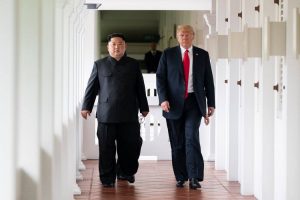The recent release of polling data shows interesting changes in South Korean attitudes toward North Korea, the denuclearization talks, U.S. President Donald Trump, and other leaders in the region. Overall, the data show that ordinary South Koreans have positive perception of recent events and an optimistic view moving forward.
The Asan Institute of Policy Studies’ Public Opinion Studies Program conducted the polling and analyzed the data in a report titled, “U.S.-North Korea Summit and South Koreans’ Perceptions of Neighboring Countries.” The data shows Kim Jong Un and Donald Trump’s favorability ratings have notably increased since the Singapore Summit meeting. In the report, Kim’s likability rating was measured at 4.06 points (on a scale of 0 to 10), up from 0.88 last November and 2.02 points this March. Trump, meanwhile, had the highest individual rating, at 5.16 points, up from 3.76 in March. Both Trump and Kim were viewed more favorably than either Japanese Prime Minister Shinzo Abe (2.04) or Chinese President Xi Jinping (3.89).
The numbers for the likability of individual leaders also tracked with the perception of their specific countries. The United States stood atop at 5.97 points, North Korea at 4.71, whereas China and Japan’s were at 4.16 and 3.55 points, respectively. Interestingly, the report noted that this was the first time since the neighboring country survey began in 2010 that North Korea’s likability exceeded 4 points, the first time it surpassed China’s likability, and the first time in four years that it surpassed Japan’s. Moreover, even among more conservative South Koreans, who are known for a hard often uncompromising line toward Pyongyang, North Korea stood at 4.32 points.
In terms of the June 12 summit, 71.8 percent of respondents said the summit had achieved results; 21.5 percent said it did not. The perception of the prospects for North Korean denuclearization also shifted. In March, 23.7 percent said it was impossible. Only 10.2 percent said so in the recent poll. Additionally, from March to July the expected timeframe for denuclearization dropped from 10.9 years to 6.5. As the report argues, such optimism is likely a result of increasing trust. Six out of 10 respondents predicted Pyongyang would carry out the agreement (i.e. the Kim-Trump Joint Statement), a result of 54 percent of the respondents saying Pyongyang could be trusted, up from merely 10.7 percent in the 2013 survey. Alternatively, the number of people who said Pyongyang could not be trusted dropped from 85.1 percent in 2013 to 43.5 percent in 2018.
Of notable significance, though, was the fact that younger respondents held a less optimistic view of events. For South Koreans in their 20s, North Korea (3.95) and Kim Jong Un’s likability (3) ratings were well below the average. Also, where 51.9 percent of respondents agreed with the decision to halt ROK-U.S. military exercises, only 39.1 percent of younger people agreed. As my previous analysis shows, the younger cohort in South Korea actually hold relatively conservative or hardline views toward Pyongyang, borne mainly from the nature of their formative experiences growing up in the shadow of the ongoing nuclear crisis and North Korean provocations.
The takeaway? The perception of things is positive (and that is good), but public opinion is fickle. It is fickle in South Korea as it is elsewhere. Rather than a reflection of substantive worldviews or values, the recent polling indicates that South Koreans (as most people are wont to do) have responded in the moment to momentous events. The implication being that a change in conditions could easily lead to a switch in perception.
Steven Denney, graduate fellow at the Asian Institute and Ph.D. candidate at the University of Toronto, made the point well when he observed: “Attitudes such as these (they are not values) are volatile, susceptible to sudden swings and period effects. Surveys showing S. Koreans are more trustful of NK or view it more favorably indicate political attitudes are strongly affected by domestic (and international) politics.” Denney cited earlier data, from the East Asian Institute (EAI), to drive home the point. In 2005, during the Sunshine Policy, 83 percent of South Koreans polled said they say North Korea as a “brother” or “one of us.” In 2015, near the end of a decade of conservative rule, only 59 percent said the same.

































